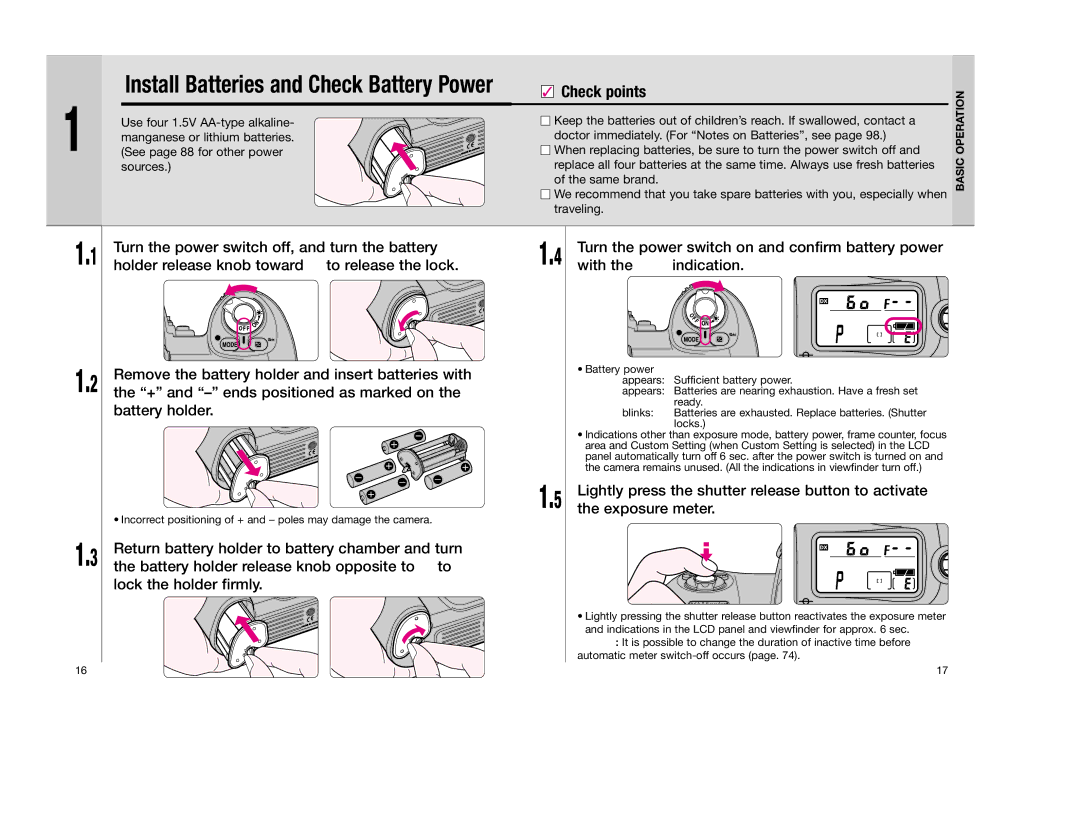Page
Nomenclature
Supplied accessories
LCD panel Viewfinder Display
LCD/Viewfinder Displays
About LCD illuminator panel
About LCD
Custom Setting
Command Dials
Film
Exposure
Introduction
Using your camera correctly
Take trial shots
Have Nikon spot-check your camera regularly
Contents
Power Mount Lens
Install Batteries and Check Battery
About This Manual
Load Film
Basic Operation
Lightly press the shutter release button to activate
Battery power Appears Sufficient battery power
Exposure meter
Incorrect positioning of + and poles may damage the camera
When camera is left unattended without lens
Mount Lens
Check the lens type
Speed setting is set to s, then open the camera
Turn the power switch on, confirm that the film
Load Film
Back by sliding the camera back lock release lever
Set the focus mode selector to S Single Servo AF
Rotate the focus area selector lock release
Select center focus area with the focus area selector
Shooting characteristics of exposure modes
Symbol Exposure mode Shooting characteristics
Camera controls exposure automatically
Hold Camera and Focus
Hold the camera properly
Camera shake and shutter speed
Pressing the shutter release button. Shutter speed
Confirm indications in the viewfinder while lightly
Aperture are shown in 1/3 steps
Confirm that film is completely rewound, then
About Metering System and Exposure
Metering System
Exposure
Types of CPU lenses and other usable lenses/accessories
When a non-CPU lens is attached
Lens Compatibility
Type Nikkor and other CPU Nikkor lens
Film advance mode selector lock release to select
Rotate the film advance mode selector while pressing
Film advance mode
Film
Autofocus
Set focus mode selector to S or C for autofocus operation
Focus Area
AF start button
Rotate AF area mode selector to select AF area mode
AF Area Mode
Dynamic AF Mode with Closest Subject Priority
Autofocus modes
Appears when the subject is in focus
Confirm focus indicator / and lock focus
Focus Lock
While keeping the focus locked, recompose and shoot
Manual Focus
Manual focus using Electronic Rangefinder
Low-contrast scenes
Patterned subject or scene
Exposure Metering System
Center-Weighted Metering
Matrix Metering/3D Matrix Metering
Spot Metering
Program chart
Shooting in Each Exposure Mode
¡ Programmed Auto
Compose picture, focus and shoot
Set the shutter speed by rotating the Main-Command Dial
Shutter-Priority Auto
Locking shutter speed
Set the aperture by rotating the Sub-Command Dial
£ Aperture-Priority Auto
Locking aperture
¢ Manual
Electronic analog exposure display
Exposure factor with AF Micro-Nikkor lens
Flexible Program page 47 in Programmed Auto Exposure mode
Aperture adjustment in Aperture-Priority Auto Exposure mode
Auto Exposure Lock
Auto Exposure/Flash Exposure Bracketing
Exposure Compensation
With 1/3 steps
With 1/2 steps
With one steps
Multiple Exposure
Composeshoot. picture, confirm focus indicator /
Long Time Exposure
Diopter Adjustment/LCD Illuminator
Using the tweezers, push the front edge of the holder
Changing Focusing Screens
Upward until it clicks into place
Make sure the screen is in its proper place
Self-Timer Operation
Composition
Other than
About Depth of Field and Focus Tracking
Depth of field
Focus Tracking
Creating Custom Setting
Menu/Features of Custom Setting
Custom Setting
Bracketing order
Auto Exposure/Flash Exposure Bracketing options
Switching Command Dial operations pages
Easy Exposure Compensation
Film advance in multiple exposure
Delay time for self-timer operation
Delay time for auto meter-switch off
Shutter release confirmation with self-timer LED
Aperture setting with lens’ aperture ring pages
Canceling Custom Setting
Two-Button Reset
Types of TTL Auto Flash
¤ Slow Sync
Flash Sync Mode Features
‹ Rear-Curtain Sync
› Red-Eye Reduction
Mode
Usable Optional Speedlights
Set the flash sync mode
Using the Speedlight
Attach the Speedlight and set the metering system
Confirm the flash shooting distance range and shoot
Combinations of AF Functions
Focusing operation
Optional Accessories
Right-Angle Viewing Attachment DR-4/Eyepiece Adapter DK-7
Focusing Screens
Filters
Lenses
Wireless Slave Flash Controller SU-4
Data Back MF-29 Speedlight SB-27
Speedlight SB-80DX
Accessories connected to 10-pin remote terminal
Soft case CF-57/CF-58
Neckstraps/Handstrap AH-4
Camera Care
Turn the camera power off when changing batteries
Troubleshooting
Use fresh batteries at low temperatures
Keep batteries out of children’s reach
Reduction function When a Speedlight Without Red-Eye
BuLb in S mode
Battery power With new ones
Overexposure may
Specifications
SB-50DX, SB-30, SB-29s/29, SB-28/28DX, SB-27, SB-26
Multiple exposure Activated using film advance mode dial
Equipped
104 105
AA-type lithium
Battery
Time Bulb
Exposure +20C 68F
Index
Custom Setting Menu
Nikon Corporation

